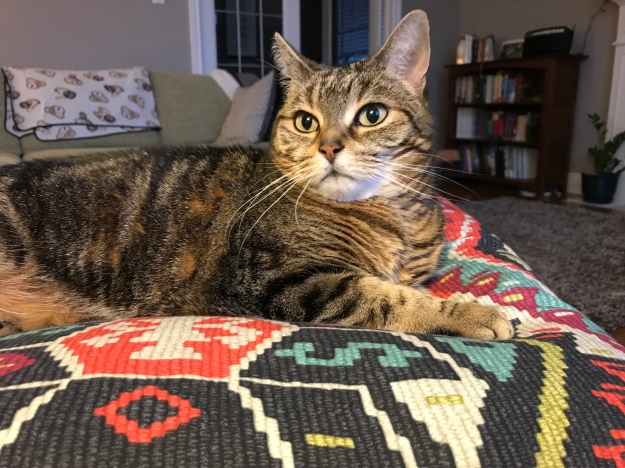“Correlation does not imply causation” is a well-worn phrase, an expression used to explain things, and (often) to smugly shut down an argument. There’s a meta effect in which the phrase has some causal power: it can cause an argument to be discarded.
Of course, though, correlation often does imply causation. Cause and effect are most definitely correlated. Pearson even designed his correlation coefficient as an index of the strength of causation. It’s just that correlation is not enough to allow a valid causal inference to be made.
Causality and the Cat
Sometimes, even direct causal links are not even enough to infer causation. My cat has an annoying habit that illustrates this.
Every morning at around 5:00am, without fail, she carries out a complicated routine in my bedroom. She starts by meowing loudly and then begins picking at the door to the closet. This reverberates loudly, enough to wake me. She will rattle the window blinds and sometimes open and slam the door to the room, and then start picking at that door. These are all loud enough, and unrelenting enough to cause me to get up, at 5:30, and head downstairs where I feed her. And today, she might have even caused me to write this essay.
These events, picking at the door and me getting up, are highly correlated. But are they causally linked? I like to imagine the cat thinks they are. That somewhere in the recesses of her dusty little cat-mind, she believes that she and she alone caused me to get up and feed her. This, I believe anthropomorphically, causes a sense of independent agency in the cat. She has purpose. She has power. Certainly, there is strong behavioural association and that’s why she continues to engage in the behaviour.
What is the candidate for causality?
Did the cat actually cause me to wake up, though? That’s not clear. There are many mediators that are outside her control that are also candidates for the cause. My own desire to wake up early is a cause. The motivation is already there and in fact I’d probably wake up around the same time anyway (though without the irritation that may have been caused by her routine). Another candidate is my desire to stop her from making noise that would wake others in the family. And I have to use the washroom. And I want to make coffee.
So the question I asked this morning was: Did she cause me to wake up or did she simply contribute to a larger causal model?
Or, did I actually cause her behaviours by getting up and reinforcing her actions, thus establishing and contributing to the symphony of slamming, picking, and pestering that seems like the cause but is actually the effect of my early rising habit? There really is no simple answer.
We are all creatures of habit
Casual reasoning, thinking about cause and effect and attempting to determine the cause, is not easy to do but yet we tend to do it anyway, almost without trying. Even in a fairly mundane scenario like the cat waking me up (or me waking up while the cat does behaviours) it’s easy to think about what is causing things, but it’s hard to establish casualty.
Like my cat, we too are creates of habit. We have a habit to look for causality in the world. These tendencies are reinforced by the correlations we observe. And because of that, we can’t stop from believing in causes that are correlated and easy to observe.
